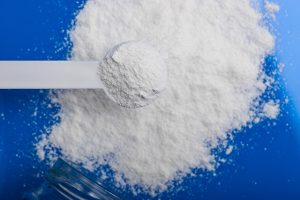Glyceryl monostearate sources, health risks
11/09/2017 / By Frances Bloomfield

More commonly known as GMS, glyceryl monostearate is a white-colored, odorless, and sweet powder that is most commonly utilized as an emulsifier. While glyceryl monostearate can occur naturally in the body as a byproduct of fat breakdown; but it can be synthetically created as well. In addition to being used as an emulsifier, glyceryl monostearate has other applications in the food industry. These range from being a preservative to an anti-caking agent to a thickener.
The U.S. Food and Drug Administration (FDA) has designated glyceryl monostearate as being “Generally Regarded as Safe”. However, a number of side effects have been linked to this substance, the majority of which come about from handling glyceryl monostearate. Some, meanwhile, arise from the over consumption of glyceryl monostearate.

Harmful effects that can be caused by glyceryl monostearate
According to FoodChemAdd.Blogspot.com, ingesting high doses of glyceryl monostearate can cause digestive problems like diarrhea, vomiting, abdominal pains, and gastrointestinal inflammation. Thirst can occur as well.
Pure glyceryl monostearate has the potential to be harmful, making it highly important for those involved in its handling to exercise caution around this material. In the event of direct contact with glyceryl monostearate, this substance can be slightly hazardous to the skin and eyes, resulting in irritation to both organs.
Moreover, glyceryl monostearate can be toxic if inhaled or ingested. Should this happen, then the respiratory or digestive tract can become aggravated. In case of accidental or deliberate ingestion, the affected persons should never be forced to vomit the glyceryl monostearate, as this makes it more likely for the substance to spread to other parts of the body.
Body systems harmed by glyceryl monostearate
Glyceryl monostearate can be considered an occupation hazard due to the chances of it causing irritation to the skin, eyes, and respiratory tract.
Whether pure or part of a food product, glyceryl monostearate can be harmful to the digestive system.
A few studies have found that glyceryl monostearate can increase the weight of the liver. Though the World Health Organization (WHO) deemed that glyceryl monostearate has no “toxicological significance”, it’s still best to keep track of the amount of glyceryl monostearate-containing foods consumed for safety purposes.
Where to learn more
- 70,000 food additives approved by the FDA – What you don’t know will hurt you
- Conventional kibble could be slowly killing your pets
- List of legal beer additives includes fish bladder, MSG, high-fructose corn syrup and insect dyes
- Sneaky meat byproducts may be making you sick – but where are they hiding?
Summary
While generally considered a safe compound, glyceryl monostearate in its pure form can be an irritant to the eyes, skin, respiratory and digestive tract. The allergic reactions that have been reported are brought on by direct contact, inhalation, or ingestion.
Glyceryl monostearate can cause digestive upsets when consumed in large quantities. These gastrointestinal problems range from diarrhea to abdominal pains to vomiting.
Sources include:
OKFoodAdd.com
FoodChemAdditives.com 1
FoodChemAdditives.com 2
FoodChemAdd.Blogspot.com
ScienceLab.com
InChem.org
Tagged Under: Glyceryl monostearate



















